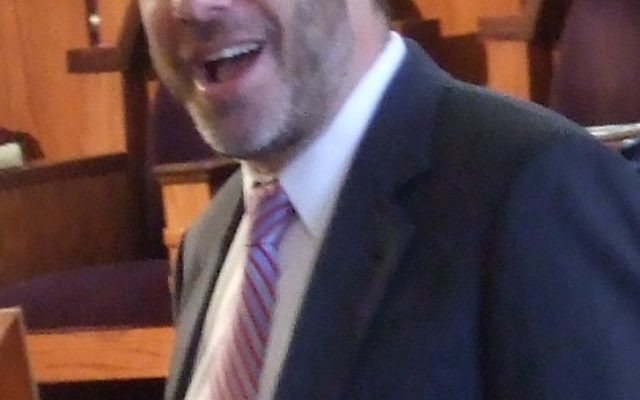Berg: ‘Progressive Judaism Triumphed’ at Zionist Congress
Overshadowed by Israeli Prime Minister Benjamin Netanyahu’s opening-day speech and the continued knifings and other terrorist attacks in Israel, the World Zionist Congress has come and gone for another five years.
Netanyahu grabbed the global headlines with a welcoming address that appeared to shift the prime blame for the Holocaust from Adolf Hitler to the World War II-era grand mufti of Jerusalem. But the three-day congress from Oct. 20 to 22 established policies and funding allocations for Zionist agencies, including the Jewish Agency for Israel and Keren Kayemeth LeIsrael, Jewish
National Fund’s Israeli wing, operating under the authority of the World Zionist Organization.
“The WZO is the supreme institution and legislative body in which all world Jewry is represented democratically. It is the parliament of the Jewish people,” said Rabbi Peter Berg of The Temple, one of several Atlantans among the 400 Americans who served as delegates or alternates to the congress. “We allocated hundreds of millions of dollars towards enhancing Jewish life in Israel and abroad.”
The WZO reported having 509 elected delegates among about 750 overall, including 145 elected in the spring from the United States. ARZA, the Zionist organization of the Reform movement, won 56 seats, or 40 percent of the U.S. total, and its global Arzeinu (“our land”) bloc held 78 seats. Rabbi Berg was one of several Atlantans in that bloc.
Among others at the Congress were Congregation Etz Chaim Rabbi Shalom Lewis and United Synagogue of Conservative Judaism International President Margo Gold, who were part of the Conservative movement’s Mercaz bloc, which held 25 of the U.S. seats and 42 overall.
“Progressive Judaism triumphed at the WZO. Zionism, after all, is not a political idea. It is a religious concept, rooted in covenant,” Rabbi Berg said in an email covering highlights of his WZC experience. “It was clear this week that a state built on Zionism must make room for multiple expressions of Judaism.”
The central theme of the congress was “Ever Moving Forward” — how the Zionist movement uses contemporary tools for perpetual goals. Among the secondary themes were responses to anti-Semitism and the boycott, divestment and sanctions movement; improved processes for aliyah and absorption of immigrants, including the strengthening of Hebrew; and the structure and relationship of Israeli institutions and nations’ Zionist federations.
In addition to Netanyahu, the speakers at the congress included Knesset Speaker Yuli Edelstein, Minister of Immigrant Absorption Ze’ev Elkin, Labor Party leader Isaac Herzog, Defense Minister Moshe Ya’alon and Jerusalem Mayor Nir Barkat.
Speaking amid a wave of stabbings and other terrorist attacks, Edelstein said a sense of normality in Israel is a key part of Zionism, according to The Jerusalem Post. Rabbi Joshua Weinberg, who heads ARZA, responded that normality requires a greater effort by Israel’s leaders to pursue peace, even if the Palestinians don’t match those efforts.
As for the Netanyahu speech, Rabbi Berg called it a missed opportunity to give a positive message. “Instead, he ticked off the same familiar list of lies that are told. His list was not inaccurate. It was just the wrong speech at the wrong time.”
Among other leaders chosen after reports of coalition building and wheeling and dealing, a Labor lawmaker, Dani Atar, was elected the new chairman of KKL-JNF and vowed to restore the public’s trust.
The congress overwhelmingly passed two environmental resolutions toward that end.
The first requires KKL-JNF, the Jewish Agency and other organizations to follow the shmita cycle and submit reports every seven years on efforts to reduce greenhouse emissions.
The second commits KKL-JNF to oppose fracking, oil drilling in the Golan Heights and other fossil fuel extraction on the lands it controls and neighboring properties that could lead to pollution of Israel’s water supply.
An Arzeinu resolution that passed with the backing of 62 percent of the delegates provides support to the LGBTQ community, forbids discrimination against LGBTQ people in Zionist institutions, and calls on the Israel Education Ministry to help organizations trying to create safe spaces.
Passing with only 51 percent support was a resolution declaring the Jewish people indigenous to Israel without denying that status to the Palestinians or anyone else.
Resolutions dealing with the significance of Zionism, allocating resources for absorption and aliyah, supporting Ethiopian Jews, assisting French Jews making aliyah, and boosting the Hebrew language and security passed unanimously, Rabbi Berg said. The congress rejected any recognition of new streams of Judaism or efforts to redefine who’s a Jew.
Reform delegates championed a resolution to create an egalitarian prayer space at the Western Wall near Robinson’s Arch — a third plaza joining the men’s and women’s sections — and took a field trip to the site.
“There is tremendous forward movement on this and even recognition by the rabbinate governing the wall,” Rabbi Berg said.
“These are challenging times for Israel. Standing up for a secure, democratic and pluralistic Jewish home is more important than ever,” Rabbi Berg added. “It was an honor to do my small part towards that goal.”





comments